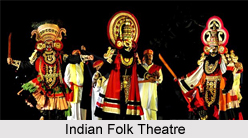Folk theatre in India has a rich legacy. In the ancient Vedic culture and even in Buddhist literature folk theatre first made its presence felt as an art form to illustrate the unedited realities of life. However, it is only in the medieval period folk theatre gradually became an integral part of Indian drama. Historically folk theatre in India did emerge back in the 15th or 16th century as illustrations from puranas, eposes, historical epics, myths and biographies of the celestial heroes. It is right after the colossal success of Indian traditional theatre as an art form, the distinct style of Indian Natya changed and thus developed a whole new theatre form where Indian myth, dance, history, song, culture, mores, traditions, and beliefs all gained a matchless dimension.
Although much later this particular theatre form was named as the Indian folk theatre, yet it is indeed not an overstatement to say that the very basic rudiments of folk theatre in establishing itself as an artform was there in the mores, heritage and tradition of India. In rural society which is still regarded as the base of folk theatre the activity which displayed the first rudiment of drama are the rituals. Quite ideally therefore rituals, their varied facets and their colossal impact on Indian culture and life formed the very base of the folk theatre in India. Folk theatre therefore boasts the rich history of Indian folk culture that dates back to the age-old antiquity.
Folk theatre in India is mainly narrative in its form. This indeed point towards the origin and the age-old sagas of the sutradhara in Indian natya. The narrator or the sutradhara in order to make his visual art lot more inventive slowly involved acting into his narrative description which in an intimate manner later gave rise to the tradition of narratives in Indian folk theatre. Folk theatre in India still has retained its age old narrative form while echoing a highly dramatic narrative style. There is a long tradition of folk entertainers who either move alone or in groups in rural India. They are the entertainers as well as the preachers of value, philosophical tenets and indeed of religious cult. Folk theatre has adopted their mode of expression amidst dance, music and songs. Thus the spirited, dynamic and ingenious in forms and rich in variety, Indian folk theatre has established itself as the powerful medium of communication in folk cultures. With its timber and colour, dash and élan folk theatre in India is more than entertainment; rather an emotional experience and an effort of creating "an environment of receptivity in which communication of ideas is an effortless process".
